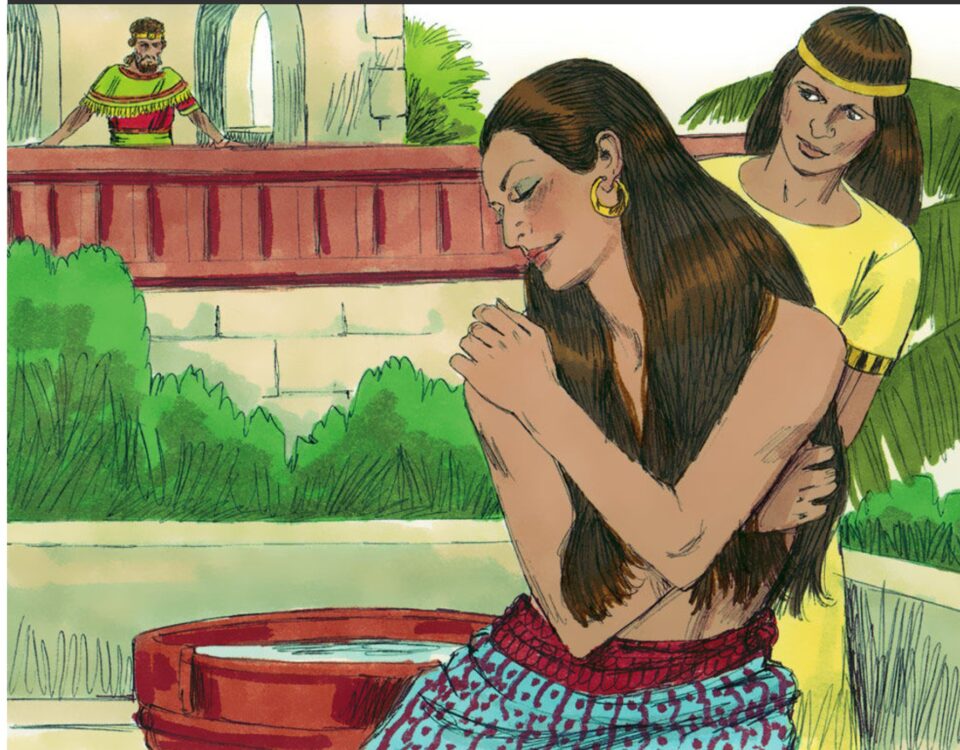Divine Retreat Centre UK – Official Website
Do You Hate God?
May 18, 2023The easiest way to control your body and passions
May 22, 2023Based on a talk by Fr Jiji Puthuveettikalam SJ
In this article, we will study Chapter 4 of Exodus. It is considered to be a beautiful chapter for people hoping to choose a vocation – be it priestly or family life or even the choice of a job or career. This chapter helps to discern our vocation. The first part(v1-17) of the chapter is a dialogue between God and Moses, whereas the second part (v18-21) begins to act out his vocation on return to Egypt. An interesting question, we can ask ourselves as the chapter begins is how a Christian should prepare for his vocation. The answer is in the first and second part of Exodus Chapter 4. When we prepare for a vocation or praying over what to do in the future, most importantly we should begin with a conversation or dialogue with God and then act out what God asks us to do. The conversation with God would provide us more clarity on what to do and when God confirms the path we need to take, we act it out in confidence, hope and trust in our Lord.
Let us now review each of the parts of Chapter 4. We will reflect on Moses’ vocation but at the same time our own vocation.
As we alluded to earlier, the first part if a dialogue between God and Moses. Before we even begin our conversation, we must be clear that for each of us, God has a clear purpose and plan. This was true even for Moses. In Ex 3:10, God had already desired for Moses to go out. I am sending you to Pharoah so that you may lead my people, the Israelites out of Egypt. So, God had already finalised what his plan for Moses was, Moses was to deliver God’s people from the slavery of the Egyptians. In Chapter 4, Moses knew that God had chosen him to deliver Israel, yet he presented three excuses. “I’m sorry, I’m sorry, I’m sorry,” each time.
Let us look at each of them.
Ex 4:1 – What if they won’t believe me and will not obey me but say the lord did not appear to you
Moses knew he had been chosen by God, yet he asked what if people do not believe him. He projected himself as not the right person but pushing his own disability or disbelief onto the people. God doesn’t leave Moses so soon, instead God replies to him with three miracles. The first two miracles are miracles of transformation. If someone doesn’t believe what God says to him, miracles come into play. Generally, miracles are for people who doubt. We need to believe in what God says. We shouldn’t be needing miracles. Miracles are only for those who still have doubts or there still is a bit of clouds in their clarity. When Moses starts to doubt God’s word, God presents him with miracles.
The first miracle
God asks Moses to put his staff down which immediately becomes a serpent and when Moses lifts it back again by the tail, it becomes a staff. Usually when snakes are caught, they are never caught by the tail, because the head would come and bite. Moses would know that. He was taking care of his father-in-law Jethro’s flock for nearly 40 years. Yet God asked him to catch the snake by the tail. But Moses immediately obeys even though it is dangerous and the serpent turns back to the staff or rod.
Second miracle
God asks Moses to put his hand in his cloak and when bought out, it turns leprous but when put back into his cloak, the hand becomes clean again.
These were the two miracles of transformation. But God had a third miracle. He told Moses if you show the people these two miracles, and even then they do not believe, you show them the third miracle – miracle of judgement.
Third Miracle
Moses would take some water from the river of Nile, and it would blood. If you read Exodus, you would know the blood doesn’t turn back into water, so it is a miracle of judgement. There would be no possibility to return back to the original.
Even seeing the miracles, Moses is not convinced. Initially he said, how could I go, people may not believe me. God told him you can show them the miracles, yet Moses tries to escape and then says he has no capability. Ex 4:10 Moses replied to the lord, “Please Lord, I have never been eloquent, either in the past or recently or since you have been speaking to your servant, because I am slow and hesitant in speech”.
In Acts 7:22, where Stephen was delivering his speech, filled with the holy spirit, he said Moses was educated in all the wisdom of the Egyptians and was powerful in speech and action. St Stephen was right, Moses was more than capable, but he was trying to escape from his vocation. He was making excuses to God about being slow, not instructed. At this point, Moses was nearly 80 years old. For the first 40 years of his life, he lived in the royal courts of the Egyptians. He had the best education possible, and he knew how to deal how to deal with people diplomatically, he knew language and geography, he knew how to lead a war. The second 40 years he lived in Median under the stewardship of Jethro, his father-in-law. Jethro was a very rich man, he had many sheep. Yet Moses wants to escape from God’s vocation. He makes excuses of being unworthy and incapable. Initially Moses blames the people and their disbelief. God offers him miracles, yet Moses again explains his disability. Again, God says, I am the one who created the mouth, and I will ask someone to speak for you – Aaron.
Let us reflect on a beautiful passage when Jesus sends his apostles to preach and deliver. Mt 10:19-20 – When they deliver you up, do not be anxious how you are to speak or what you are to say; for what you are to say will be given to you in that hour; 20 for it is not you who speak, but the Spirit of your Father speaking through you.
God tells Moses, do not worry, if you cannot speak and are slow in speech, I will arrange Aaron. Exactly what Jesus says to his disciples. Even in our case, when we go for exams or have tough situations to face. I remember a time I had an interview in Oxford. I travelled to Europe for the first time when I went to study in Italy from India and for five years, all I spoke was Italian. I had forgotten even the little English I knew. I was invited to answer an interview in Oxford and I prayed this exact word from Matthew 10:19-20. I still do not know what I spoke during the interview, but someone spoke through my tongue. I have given this testimony several times. Dear brothers and sisters, someone will always be speaking for us.
St Paul also confirms the same thing Eph 6:19 pray also for me, that utterance may be given me in opening my mouth boldly to proclaim the mystery of the gospel. When you have a problem with your speech, the Word of God gives an assurance that the Living God will appoint someone to speak on our behalf. Pray these words while preparing for an exam, or interview.
Let us go back to Moses. He made two excuses already – people’s disbelief and his own unworthiness. Yet again, Moses tries to escape from his vocation. Now he complains about his availability.
Ex 4:13 But he said, “Oh, my Lord, send, I pray, some other person.”
All of us have these difficulties with our vocation whatever be it, the priestly calling, family life or career or job or any work we do. We make excuses and try to escape from our vocation. But Moses asks God to send someone else. At this point, God gets angry. Then the Lord’s anger burned against Moses. When Moses said people wouldn’t believe, God was calm; when Moses said he isn’t capable, God was calm, he said he would provide him a speaker, but when Moses asked God to send someone else, he was showing that he isn’t available for God, at that point God became angry. In the beginning of this article, we had said that God had already prepared a plan for Moses, just like he has for us and we need to accept it. If we don’t have the capabilities, God will arrange but after that we have no right to say I’m unavailable. Whatever obstacles Moses presented, we still need to go ahead and execute our vocation, our calling. In Ex 4:17, God is encouraging Moses, And you shall take in your hand this rod, with which you shall do the signs. What would be the staff/rod in our situations? The cross – which means whether I’m a priest or a religious, whether you are
having a difficult time with your vocation, just take up the Cross in your hands, and you will start performing miracles. Dear brothers and sist.ers, please do consider reading Exodus 4 and this beautiful conversation and meditating on it. It is our own story.
The second part of Chapter 4 speaks about how Moses begins to act out his vocation. Although he presented three excuses, God did not leave him. He provided him with solutions. In the end God said take the staff and don’t worry. God tells us the same thing. Take the cross, take Jesus.
Ex 4:20 So, Moses took his wife and his sons and set them on an ass, and went back to the land of Egypt; and in his hand Moses took the rod of God. Moses took the staff with which he could perform miracles. If you notice, as soon as Moses and God finished the dialogue and God asked Moses to carry the staff, he set out. He didn’t delay.
Dear brothers and sisters, sometimes when we have dialogue with God, we get irritated or God may get irritated with us, but then remain there in peace, and all will be fine. God reminds Moses, when you go to Egypt, show the miracles to Pharoah. I will make his heart hardened. This is surprising. Why would God send Moses this far? Moses didn’t want to go, but God was encouraging him. The moment Moses was ready, God tells him that Pharoah’s heart will be hardened. Why would God do that? Shouldn’t he have liberated Pharoah’s heart? We may look at it from a human way.
Maybe God wanted to make Moses more stronger, to make him more trained and capable. Or God never acts against our free will. Pharoah had already decided not to liberate the people of Israel. So, God would not act against our will, but he will guide us to overcome our will. It is us who finally need to take decisions.
But I believe, God wanted to make Moses a strong man. Even at 80. God want to train Moses because he had another 40 years of desert experience, where people would complain, about leaving Egypt, about food, about water, about hardships. So, God was training Moses to face difficult questions.
Dear brothers and sisters, if God has called us for a particular vocation, he will give us the best training for that, and he is the one who gives us the training, he will never leave us empty-handed, He is a God of his covenant, he will always be sincere faithful to his covenant



